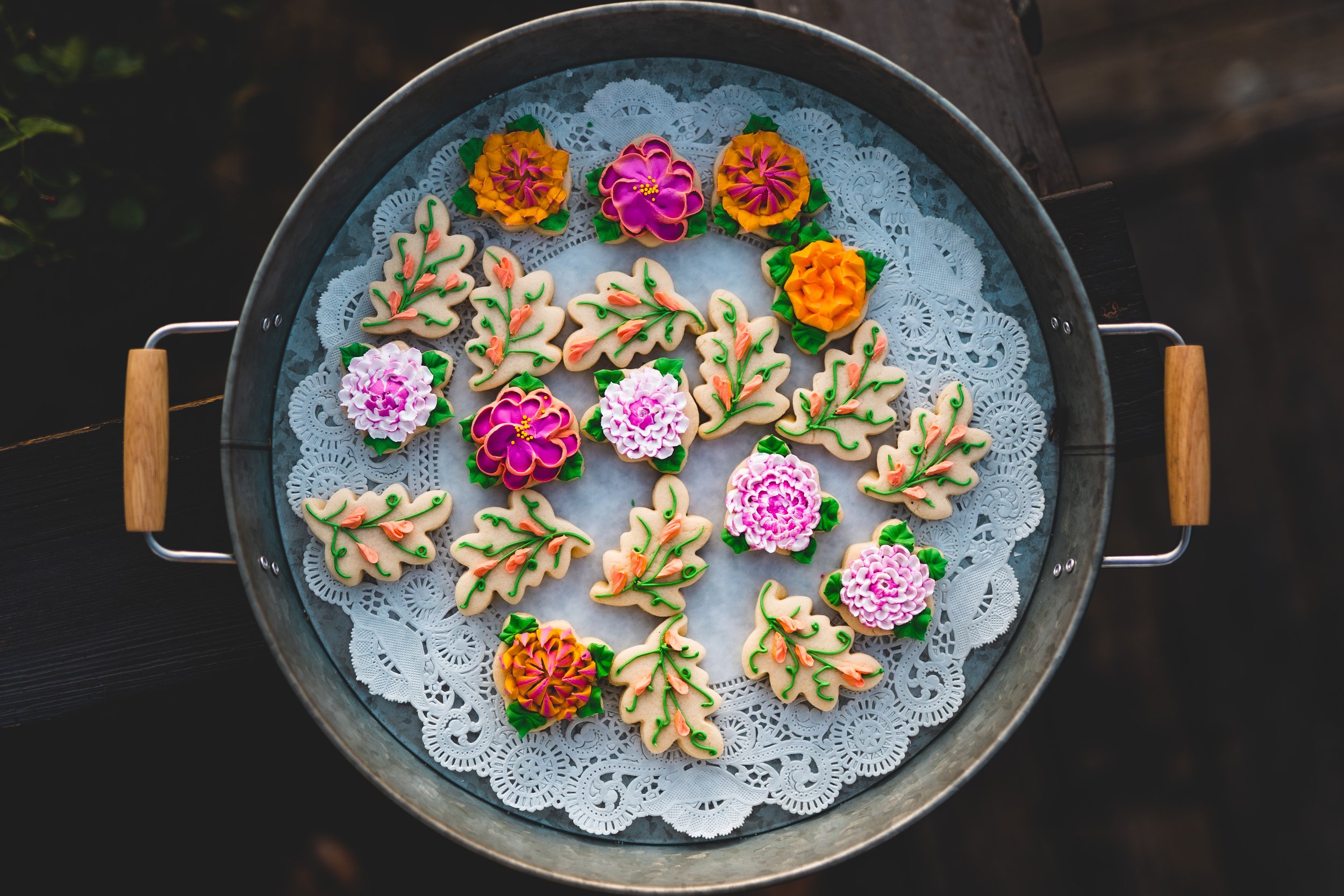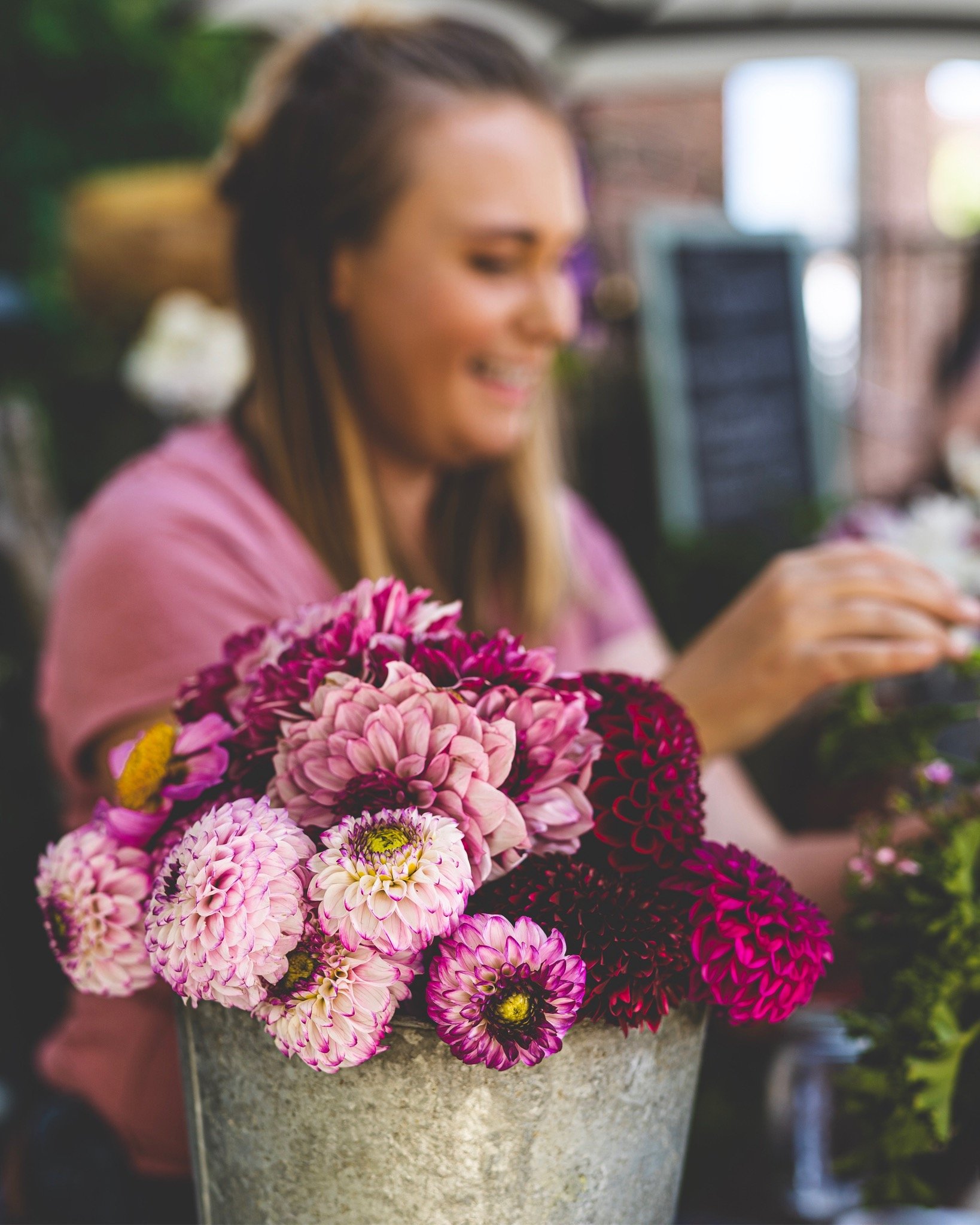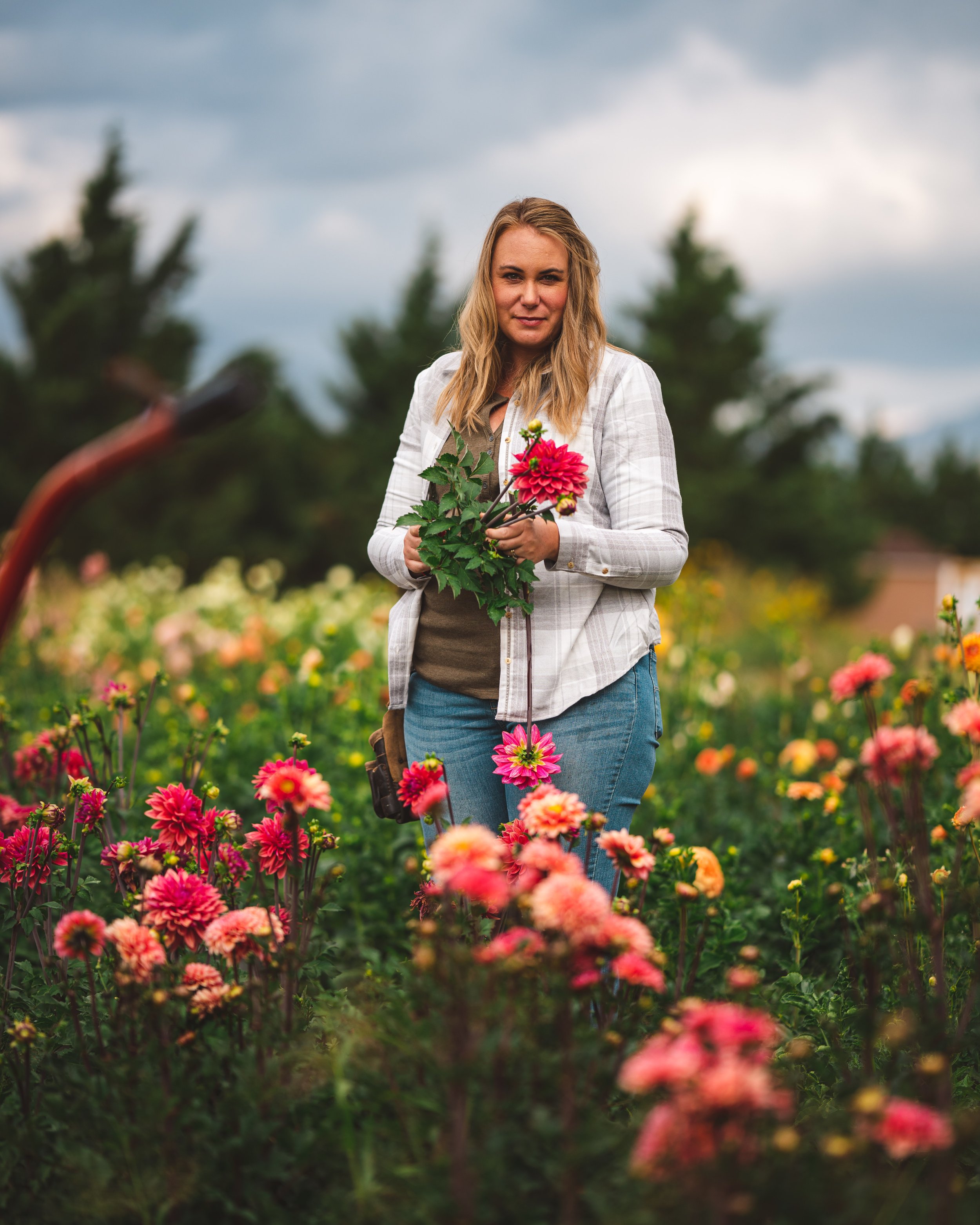You don't need a field in bloom to sell your flowers (business startup)
What?! What does this even mean?! Obviously you need flowers in your field to sell flowers right?
Right.
But… you just said I didn’t?
You don’t.
Huh?
You can sell flowers before your field is blooming, even as a first year flower farmer. If you want to treat your flower farm as a business this step is going to be crucial. I will warn you: this is going to push you out of your comfort zone but it is also the beginning steps in making sales.
What do you even mean by all this gibberish?
You will need to begin branding and “selling” your product before you harvest that first stem from your field.
You will do this by:
Making sure you are setting up your flower farm as a business
Begin building your community and potential sales outlets
Not allowing yourself to fail.
Let’s start this off with a little story.
I have some amazing friends who opened a coffee shop. Their business has been going strong and providing much needed caffeination to our community for over three, almost four years now. The interesting part about their origin story is: they promoted the opening of this coffee shop for two years before opening it. At the time they began handing out flashy stickers with their business name on it, promoting themselves on social media, word of mouth, local markets and festivals… they didn’t even have a location… for two years!
They were committed to making it happen, even though they didn’t have a building, let alone any actual product.
What they did sell was branding and anticipation for their grand opening. Their grand opening was delayed by a few months from what they initially thought but when they did open, hiccups and all: they were well received and are an essential hub to our community.
The reason I share this story is to demonstrate that you don’t actually have to have product in hand to be able to begin building your brand, making connections and “selling” your product.
Oftentimes, newer flower farmers get hung up on self promotion, sales outlets, product decisions because they don’t have photos, previous experience growing and assembling of bouquets… a lot of self doubt and almost an imposter-syndrome-type-feeling. I am here to tell you: you are not an imposter. You are not in any way not a “real” flower farmer. You are new and on an exciting new journey of flower farming, this is something to be excited for and build up anticipation. There are two things you need to really get off on the good start to make this all work.
You need to have is vision and commitment to that vision. Part of having the commitment to that vision is approaching your flower farming business as a business from the start and building a community around your brand. I mean, if our coffee friends we just told you about can promote themselves for two years, why can’t we for a few months?
Meanwhile, let’s make sure we get all the nitty gritty business stuff in place.
Setting up your flower farming business
As mentioned in previous blogs, once you begin exchanging goods for cash: you are officially in business, whether you feel like you are or not. If your goal is beyond growing pretty flowers for fun but to have an actual flower farming business, you need to approach it as such.
Being in business comes with having to take on certain responsibilities and some set up to ensure that you are running your business in compliance with local, state and federal laws and regulations. This is not only to ensure that Uncle Sam gets his payday but to also protect you from potential liability.
Coming from a family of accountants, I have heard horror stories of small business owners getting in trouble, financially usually, from not doing proper business planning or set up. You may feel your sales don’t warrant jumping through all the hoops but once again, if you are actively exchanging goods for money: it does.
You could be a great grower that knows how to successfully grow and care for the product but the business aspect is a whole new realm that maybe makes you uncomfortable. Hopefully, by the end of this blog post you will be more comfortable and ready to dive into selling your product professionally!
Let’s cover some tips, tasks and foods for thought.
Can you realistically have a commercial growing patch where you are planning on having one?
First, you should check on anything that could prohibit you from growing/selling commercially on the property you are looking to grow on, such as: certain regulations like CC & Rs (Covenants, Conditions and Regulations) in your neighborhood, or county/city code and related zoning regulations. If you are planning on having an on-site farm stand or building high tunnels, you need to chat with the folks at the county office to make sure that you can and that their are no limitations to factor in (permits to get, etc). Figure out if your idea is even realistic to do before investing too much time and money into it. The last thing you want is to have to shut down your operation and pay fines. Research if you have any limitations to work with or any no-goes in general.
Once you know you can in fact flower farm on the property you are looking on utilizing, then it’s time for the next step.
Decide on a business name and purchase domain
Before going through all the hassles of setting up your business name, you should really research to see if it available in your area and even more so, if the related domain name your desire is available. The first place to start is on your state’s “Secretary of State” website. Here you can look up your desired business name and see if anyone else has already registered that name with the state. Secondly, if you are going to be a sole-proprietor and want to operate under your desired business name instead of your legal name, then you want to make sure that the name has not already been registered as a DBA or fictitious name with your county clerks office. Ideally, you want to be able to have a “.com” website, since that is for commercial operations and it’s the easiest to remember. You want to be able to have a domain name that is related to your business name to keep it simple for customers or potential customers to remember. We use this website to check on domain name availability and to purchase the domain (some other sites you just “rent” from them…). If the business name you want is open that’s awesome! Then it’s time for your next big step!
Talk to your CPA
Before going too much further, you should talk to your CPA. This is important, especially if you have assets that truly need protecting. Your CPA will help you figure out the proper business set up that will protect your assets and be the most beneficial to you for tax purposes. Just like flower farming is not one size fits all, neither are our unique businesses and financial situations. Utilize the professionals to make sure you have all your ducks in a row in this aspect. There are many things to consider and some things are just not worth messing up on. I mean, I talk to my accountant every day! Okay, well, you probably don’t have that luxury (potentially punishment?) to do that but I bet you can squeeze in one 30 minute or hour meeting to get your business set up started on the right foot. Pro-tip: Just try to not schedule your meeting during the craziness of tax season, so you can get your CPA’s full attention without them getting annoyed with you!
Some topics you can expect to discuss with your CPA are:
Entity Selection
Liability protection
Self-Employment tax
Tax planning
Preparation fees
And possibly Bookkeeping
Once you have all that fun stuff out of the way, and you have decided upon an entity or filling type and have that said entity setup (most likely by a licensed attorney) your CPA will most likely recommend taking this next step…
Get a business checking bank account
This is so important and anytime a client tells Graham they are starting a new business, the first thing he tells them is to get a business bank account. This will keep personal and business transactions from mucking the water, so to speak. It will make for easier bookkeeping and your paper trail nice and tidy when it comes time to prepare tax returns. Along with setting up a bank account, we had to take one extra step that may or may not be relevant to you.
As I previously touched on, since we wanted people to be able to make checks to our business name, rather than just my name (Jessica Chase), and we were, for years, just a simple sole-proprietor we had to take the extra step of filing and paying for a “fictitious name” at our county clerk’s office. Speaking to your CPA or banker, they should be able to tell you if this is something you need to do, as if you have set up a separate entity with your secretary of state’s office you wont need to do this. We could have skipped this step and had the business account just under my name but let’s be honest: a lot of customers may not remember my name but they know my business name. Honestly, half the time they think my name is Sierra… Having a business checking account under your business name makes it easier on the customer, they can choose to write a check out to me or to Sierra Flower Farm (and a majority choose Sierra Flower Farm).
Once you have your business entity and checking account all set up like a big-grown-up-business-kid, let’s move onto the next steps.
Contacting your state’s department of agriculture
Each state will have their own unique regulations as it pertains to the department of agriculture: fees, permits, licenses, etc. You will want to visit the appropriate website to begin getting in contact with the right person to work with. If you can’t figure out their website or get answers, talking with other local growers or farmers market managers are a great starting point as well.
In our state, we are required to get a “producer’s certificate.” This certificate actually does some good, in that it validates that we are in fact the growers and not resellers. We begin by filling out the application, pay a fee, then they send someone out to inspect our growing fields to make sure we are actually growing. They typically like to do this inspection in spring when they can see crops actively growing. We have people we work with on that side but on the other side for anything nursery stock (seeds, plants, etc.) we work with someone from that department. Typically, we simply file a waiver since we usually don’t sell much in regards to nursery stock items.
Your department of agriculture, typically assigns you a rep who you stay in contact with. Use them if you need them! They are there to answer questions, help guide you in the general direction along with announcing grants and continuing education seminars, etc.
Insurance
Having a liability insurance policy is important in protecting you and your business. If you are a vendor at a market or a florist working a venue, having an insurance policy is most likely required. Typically it is a commercial liability insurance policy of $1,000,000 but some may require $2,000,000. During the meeting with your CPA, they may have mentioned there is a big difference between having liability protection versus liability insurance- they are different and liability protection (aka. corporate protection) is not a substitute for insurance. You will want to talk to your agent and make sure you are in fact, getting the proper liability insurance. A good place to start is to talk to your current insurance agent to see what options you may have to add your business to your current policy.
For us, we actually went beyond that and were told since we were “farming” that simply adding a policy to our current one wasn’t an option since they company did not offer one for farmers. What we ended up doing was talking to some grower friends to see what they did and they sent us down a whole path we had no idea even existed. We joined the Nevada Farmer’s Bureau to be able to get the proper liability insurance that will give us more protection not only as vendors or florists at venues but if something happens due to our product or on our growing site.
Building your community
One topic I seem to repeat over and over again is the importance of building a community around yourself and your business. Now, this doesn’t mean community outreach, though it can certainly include it.
What I mean by community is beneficial business relationships, primarily. A good place to start is to seek out businesses that interest you, that speak to you, that you believe can be a good brand alliance.
Brand alliance is really important, especially in the beginning as you are working on building recognition and reputation. Partnering business friends speaks to your brand, whether you yourself are physically there or not. Some characteristics that are important to us when we consider aligning brands with business friends is:
Customer service and provided experience
Product offering- does it make sense?
Jiving with the personalities of the business owner and their employees
Customer service is huge, we are looking to provide a positive experience for our customers. I would have to say that is certainly number one with us. The business location can seem beautiful and popular but if they don’t seem to be welcoming and helpful to customers that’s a big red flag. This is especially important for our subscription pickup locations. We aren’t there to hand out our blooms, so we rely on the hosting business and their employees to hand off the flowers in a kind and compassionate matter, that is consistent with our brand and our customer service. I’m going to share a story from last season.
In the 2021 season, we opened up last minute a new pickup location. The business owner reached out and asked us if she could be a pickup location for us and perhaps sell some bouquets as well. It seemed great, the owner has a great reputation. Enter staff shortages and the customer service experience quickly went downhill, at least for our subscription members. When I would walk in to drop off the flowers, the employees seemed overwhelmed and bothered. At first, I wrote it off that maybe it was just me and the timing. Then, it became that I would show up to drop off the flowers and without any kind of notice their store was closed. Now, it wasn’t a location I felt comfortable leaving flowers for pickup outside of the building, therefore, it left me last minute having to switch pickup locations for members or providing home delivery to them. We made it the first leg of the season, so spring, I followed up with some members on their experience and we decided to pull from that hosting business. We are always incredibly thankful for a business opening up their store to us and our customers, sometimes it doesn’t work out and that’s okay. We still appreciate the gesture and the effort!
That was a cautionary tale but really, I have way more positive experiences then negative ones. Our other pickup locations have been beyond amazing and the business owners have been an incredibly influential and inspiring to me. Bonus, they are all actually woman-owned which I didn’t realize until this moment, makes it all even better! Each business we have done pop-ups at, had as pickup locations (minus that one just shared) have had stellar customer service and their loyal customer base shows that.
Aside from customer service, does my product being tied to their business make sense? Kind of like: I don’t think I want flowers in a tire shop. It doesn’t necessarily make sense and I’m pretty sure the flowers would smell like stinky rubber. Usually, choosing locations that involve relaxation, beauty, home decor and simply a place that you build happy memories at are good business alliances in my opinion. Book stores, coffee shops, boutiques, perhaps even a cute hair salon- we even have a pickup location at a golf course. It seems odd, but their location is convenient for many of our members, the staff are super sweet and most people hanging out there are in a good mood and relaxing. We feed off of each other and our environments.
Another big consideration is do you jive with the business owner and their employees? I mean, it doesn’t have to be jedi-mind-meld level but they should be excited for what you’re doing and you should be excited for what they are doing. You don’t want any kind of resentment on either side and you want to be able to promote and cheerlead each other while you both are benefiting from the brand alliance.
Outside of having brand alliances as far as sales outlets, building a network of friends who are also small business owners is incredibly invaluable. In the early days of Sierra Flower Farm, we were fortunate enough to be grouped together with other small business owners as we all sold products at the cute vintage market. During that time, we were all in the beginning steps of starting our businesses. Looking at all our different product offerings you would kind of wonder how we could have anything in common: watercolor art, jewelry, cookies, home decor, glass art, photography, me with the dirt and flowers. That time was so incredibly special. Other flower farmers aren’t the only ones who will understand your struggles. Sure, they may understand the gut wrenching feeling of a frost wiping out your crop or earwigs munching on your dahlias but other small business owners and creatives will understand so many of the other elements of being an entrepreneur. They understand the struggles of marketing, dissatisfied customers, competition, ingenuity and more. They will be there to celebrate your sale and to lean on when having a bad day. Having a support system, I can’t even begin to explain how important it is. On top of it, you can partner together for fun and unique collaborations, inspire each other and simply support one another. We made great connections through being vendors not only at the vintage market but by being vendors at other festivals, pop-ups, and farmers market. I personally love our diverse community that is also a great support system. We have growing friends who understand the chaos of what we do and can help mentor us on the growing side of our business. We have our other entrepreneur friends that through them we made more connections with other small business friends, which led us to many other opportunities. Community is vital.
Get failure as an option off the table
If you allow yourself the idea that you will fail, you will fail.
Oftentimes I think we mistakenly call obstacles or lessons “failures.” Perceiving challenges as “failures” is such a negative way of thinking. This creates space where fear can paralyze you and make you begin your flower farming journey feeling defeated. This part can make you avoid approaching your flower farming business as an actual business. What I mean, growing the flowers then selling them super cheap under the table or even just giving them away because you’re fearful that you may fail or even be rejected. Giving your flowers away can be a comfortable place to hide… at least temporarily.
Eventually, it won’t be of benefit to you. When you do begin to sell those flowers for what they are worth and treating your flower farming endeavor as the business you desire, it may take a lot of retraining of potential customers in your market or most likely what you’ll find is they weren’t your customers: they were there for the cheap/free blooms. As mentioned in the beginning of this post, depending on various local/state/federal regulations you may find yourself in the hot soup with agencies you don’t want to be on their radar. Overall, it can be damaging to your flower farming dream.
Take failure off the table as an option. It is not an option. You are not going to fail. Your flowers are not going to fail. Instead, you are going to show up and do your best. In the moment when you are facing challenges, you are going to problem solve the best you can to overcome those challenges. You are going to build a community around you that is going to support you by being your customers and also community of small business owners to encourage you. Stay out of the dark corners of your mind where doubt can consume you. Instead, continue putting one foot forward, get up when you stumble and then continue putting one foot forward. Do so with humility and graciousness. You will succeed.
I want to leave you with this, it is something I have said for many years now and it is nonetheless true: the flowers want to grow, we have that in our favor.
Until next time, we are looking forward to helping you hand blooms soon!
Jessica
Livestream tonight 2/2/22 on our YouTube channel 6pm PST! Join us as we go over some business start up basics and chat about what Valentine’s Day means as a farmer-florist!










